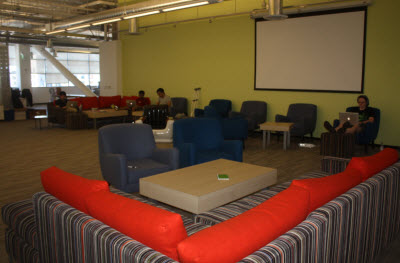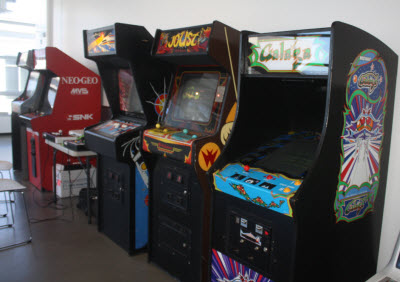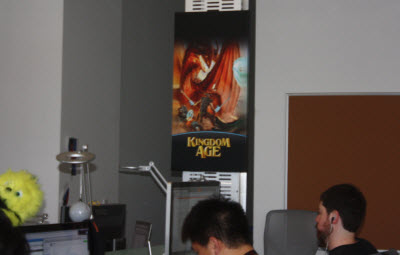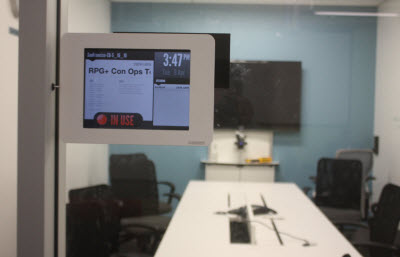 GamesBeat: It seems like a way to get something that happens — a notification — in front of the user on a full screen pretty easily. If that’s a notification from a game, maybe that’s good for games.
GamesBeat: It seems like a way to get something that happens — a notification — in front of the user on a full screen pretty easily. If that’s a notification from a game, maybe that’s good for games.
Aoyagi: Yeah, that makes sense. That might be powerful. Facebook, Twitter, those social notifications are one good source of our user acquisition and engagement.
GamesBeat: But they didn’t talk about that much. I sent a message out to everybody that I know, spammed everybody saying, “What do you think of Facebook Home?” I only heard from maybe three people, and they all said, “Yeah, it could be good.” The message didn’t really target game developers or publishers.
Aoyagi: They don’t talk about games much, no. We’re still working with them, though. We’re trying Facebook ads. The benefit is the notification and the targeting. Those features on Facebook are still really valuable. They’re trying. With Home, I think it’s the Facebook approach — start with something small and then see what works. If it works, we can take advantage of it.
GamesBeat: You guys had a setback with the shutdown of OpenFeint. It made a lot of developers angry. What’s your thinking on platforms?
Aoyagi: We still have a mission to build a platform in the mid-term, but now we’ve decided to step back and focus on making games, at least in the United States. In Japan, we’re still working on platform stuff, but the approach might be a bit different. We’ve seen that the messaging app is evolving. Instead of making a comprehensive gaming network platform, we can try other approaches. We still have an ambition there, but we’ve decided to focus on other things. With this U.S. studio, we’re working on games.
Since we made that transition over the last year, we’ve enjoyed growing revenues. We’re going to disclose a new forecast in May, in a month or so.
 GamesBeat: Third parties and first-party, what sort of mix are you using there?
GamesBeat: Third parties and first-party, what sort of mix are you using there?
Aoyagi: First-party is growing. Of course, third-party is growing, but the growth on the first-party side is much faster. I’m happy with that.
GamesBeat: Did the absence of the platform impact the third-party side?
Aoyagi: Actually, no. Not for all the third-party games, but some games, we’re sending traffic from our first-party games. They’re getting users from that direction. Instead of making a comprehensive platform, we’re focusing on the cross-promotion among those top-grossing games. That’s been effective.
GamesBeat: What’s working well now? You had a whole list of all those monetization options, Chartboost, and whatever. What helps you the most when you’re trying to cross-promote and trying to make money? NativeX, W3i, they announced what they call a NativeAd, which is more of an in-game ad, with 65 percent of it created by the developer and 35 percent created by the advertiser. It’s more like part of the game.
Aoyagi: In-app purchases and in-app billing are actually the biggest part of our revenue. The ads are not so significant yet. On the monetization side and the user acquisition side, we don’t rely on anyone else. We’re working with a number of people and we’re trying to optimize that, but we don’t look at one channel or another and say, “Yes, this is working.” I don’t see that in any of them.
The most successful thing we did in the last year is actually picking up all the monetization stuff with Funzio. Modern War, Kingdom Age, Crime City, those titles are coming back on the top-grossing charts. What we’re doing is, of course, user acquisition, but we’re also introducing new monetization techniques, live ops, and more staff. That made that increase in revenue happen. Modern War made it to number two in January and number three in February and March. Of course, there are still two games up there — Clash of Clans and Candy Crush Saga.
 GamesBeat: Have they set a new standard, do you think?
GamesBeat: Have they set a new standard, do you think?
Aoyagi: In 2012, we could make it to the number one spot. Now, those top two games are making a lot of money. A billion-dollar annual revenue title could be there. Puzzle & Dragons is close to that as well. Their growth in the western markets and the rest of the world is pretty big. The Japanese market, at some point your growth is capped there. But I think we’ll see a billion-dollar title pretty soon. Next year at the latest.
GamesBeat: Rovio’s revenues are interesting to look at as well. They’re getting so much more profit from licensing, plush toys, and all that.
Aoyagi: That strategy games sense given that they have so much audience, so many daily active users. It’s good to have those other ways to monetize. It’s an advantage to making those strong IPs and characters. You look at Disney, they’re doing pretty well in the game space with Marvel and all those other titles.
GamesBeat: Toys might be the next big business.
Aoyagi: We’re doing that in Japan, actually. We recently introduced some character goods from our more popular titles. It’s similar to what Bandai Namco is doing. They’re pretty good at that with Gundam and the like. We have a cartoon coming out in Japan, even, based on Clinoppe. That’s one of two animation projects in the works. The games business is very iterative – we need to make new games every year – so if we have those other ways to monetize, that’s a way to stabilize our revenue and growth.
GamesBeat: It’s been interesting to see what’s happened in the traditional games business, with THQ and Atari and LucasArts all running into trouble.
Aoyagi: Square Enix, too. It’s very sad.
GamesBeat: The pace of the transition seems to have picked up.
Aoyagi: This year is going to be more accelerated by the arrival of the Mini with the seven-inch screen. The iPhone and the iPad are both pretty big markets already, but the revenue from the iPad is even bigger than the iPhone side. On the Android side, the tablet market still isn’t a huge market. If we see a big introduction on the Android tablet side, that’s going to be big. In the western market, including the U.S. and the U.K., the iPad is bigger than the Android tablet, so developers are still saying iOS first, even the ones making hardcore games for tablets. But if that tablet market takes off, the Android market will be pretty big. Developers will start picking Android first, instead of iOS.
GamesBeat: Are you interested much in the Android hardware devices, like Ouya or GameStick?
Aoyagi: They’re interesting for gamers, but casual, non-gaming users are still going to stick with iPhone or iPad and the like.
GamesBeat: Some people have pointed out that the TV market is kind of small. If you think of all the console gamers, there’s maybe 200 million. You have a billion mobile gamers already. What’s the motivation in trying to take over the TV audience when there’s already so much competition? For the next few months, for 2013, what are you expecting for Gree?
Aoyagi: For Gree, we’re going to have a big quarter. We’re going to have many different games launching. It’s an interesting time for us. We’re also going to distribute some new games in the Korean market.
GamesBeat: Are those going from the U.S. to Korea, or Japan to Korea?
Aoyagi: From Japan to Korea and from Korea to Korea. We’re expanding globally. The western market is first, and then the Korean market.

